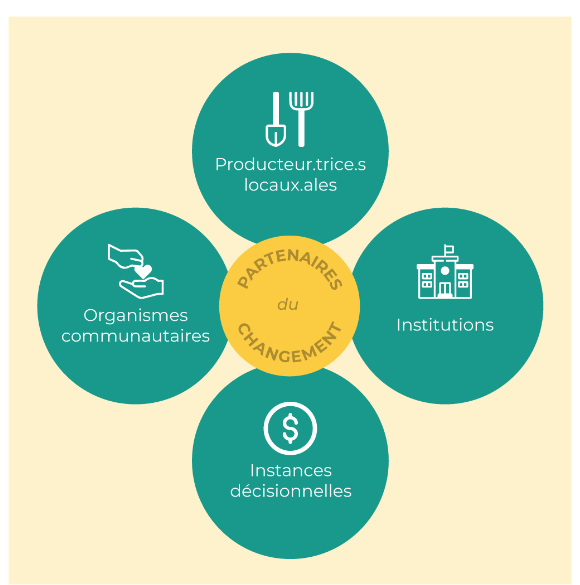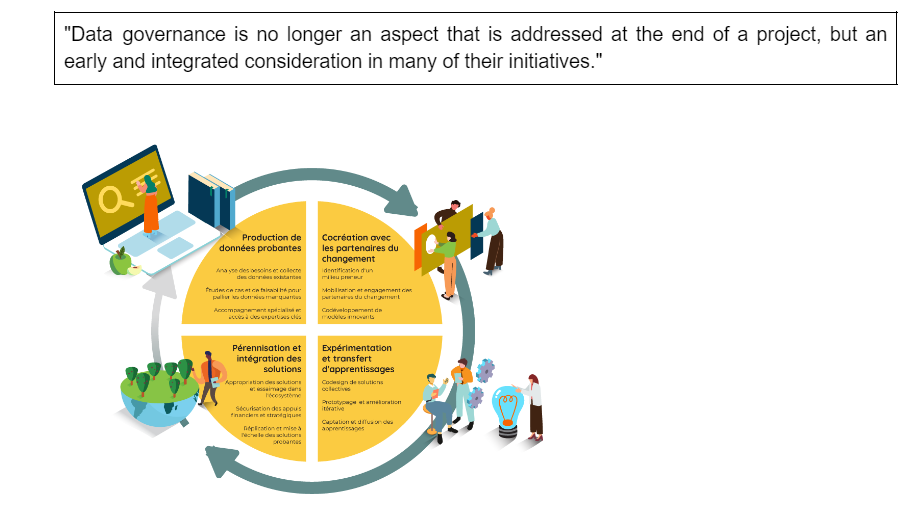note General note
Feeding Data Through Collaboration: Collectif Récolte's Approach to a Sustainable Food System
For the past six years, Collectif Récolte has played a pivotal role in enhancing Montreal's community food supply by promoting principles of collective intelligence and sustainability. At the core of their efforts is the SALIM (Système alimentaire, local et intégré à Montréal) project, which aims to consolidate the supply network and facilitate local producers' access to markets via an innovative network of shared infrastructures. Supported by the Montréal in Common program, the project brings together 37 partners in a collaborative initiative to promote sustainable food systems and stimulate the exchange of resources and knowledge between stakeholders in the Montréal food sector.

Collectif Récolte has implemented an impact measurement system to assess the effectiveness of its collaboration with its partners. Driven by a commitment to continuous improvement, Collectif Récolte places a significant emphasis on measuring its impact. The organization conducts annual consultations with its partners to gauge the outcomes of the SALIM project and the benefits derived from the support provided by Collectif Récolte.
It is in this context that Collectif Récolte was able to benefit from targeted coaching sessions with Open North, a non-profit organization specializing in the responsible use of data and technology. The program enables Montréal in Common partners to progressively put into practice the principles of the City of Montreal's Digital Data Charter thanks to Open North's expertise in data governance, and thus propel their organizations as part of the Smart Cities Challenge.

"The mission of project SALIM is to make local and organic food accessible to Montrealers, especially the most vulnerable. But how do we assess the impact of our initiatives with our partners? When measuring our impact, it seemed essential to implement appropriate and effective data governance methods. Open North provided invaluable support, helping us to establish best practices and guide our thinking on the challenges of collecting and sharing data" - Logan Penvern, Impact Measurement Manager at Collectif Récolte.
Challenges and Benefits of Collectif Récolte's Impact Measurement
Through consultations with partners, the SALIM team found that data governance relies not only on technology, but also on trust, collaboration and organizational culture.
By actively involving its partners in the impact assessment process, Collectif Récolte has created a breeding ground for collaboration. A more robust data culture has taken root, generating valuable knowledge to guide future initiatives.
Following the targeted support sessions provided by Open North, Collectif Récolte made significant progress in fostering awareness among its team and management regarding the importance of data governance and its associated best practices. This awareness has resulted in better integration of these issues within the organization, particularly through the adoption of proactive measures and best practices that go beyond the SALIM project.

The SALIM Project's Strategies For Action
One possible way forward for the SALIM project team would be to continue capitalizing on their efforts through a digital data partnership, an initiative that brings organizations together around a common goal and requires the sharing and leveraging of data. The success of such a partnership hinges on one crucial element: adherence to a shared vision.
Logan Penvern, in charge of impact measurement at Collectif Récolte, shares his thoughts and the actions taken by his organization to improve data governance in this case study: Mobilizing Partners and Collecting Data: the SALIM Project Team's Approach to Impact Measurement.
About the Montréal in Common Data Governance Workstream
As the lead of the Data Governance Workstream within Montréal in Common, Open North proposes a data governance journey to the innovation community in order to progressively operationalize the principles of the City of Montreal's Digital Data Charter. The program explicitly focuses on collecting, sharing and leveraging data to inform collective and individual decision-making.
Montréal in Common brings together an innovation community led by the City of Montréal, whose partners are experimenting with solutions in food access, mobility and municipal regulations in a desire to rethink the metropolis. Thirteen projects are being implemented as part of Montréal in Common thanks to the $50 million prize awarded to the city by the Government of Canada as part of the Smart Cities Challenge.
*All pictures will be translated shortly
Did you like this blog post? Would you like to know more about data governance? Not sure where to start? Find other resources, free training courses and more on our website: https://opennorth.ca/
Author : Open North
Research and editorial contributions: Alexandra Gellé, Jérémy Diaz and Logan Penvern (Collectif Récolte)
We extend our thanks to all our partners and clients, whose work continuously expands and evolves our understanding of data governance and its best practices.
Linked notebook(s)
 file_copy
33 notes
file_copy
33 notes
Chantier de la gouvernance des données de Montréal en commun
file_copy 33 notesAuthor(s) of note
Contact the author(s)Linked community
Montréal en commun
More informationPublished
June 27, 2024
Edited
June 27, 2024, 1:44 p.m.
Visibility
public
Quote this note
Nord Ouvert, Collectif Récolte. (2024). Feeding Data Through Collaboration: Collectif Récolte's Approach to a Sustainable Food System. Praxis (consulted June 30, 2024), https://praxis.encommun.io/en/n/cqbhxKpMKmyZFA_1KZHoTeVteD8/.
shareCopy
